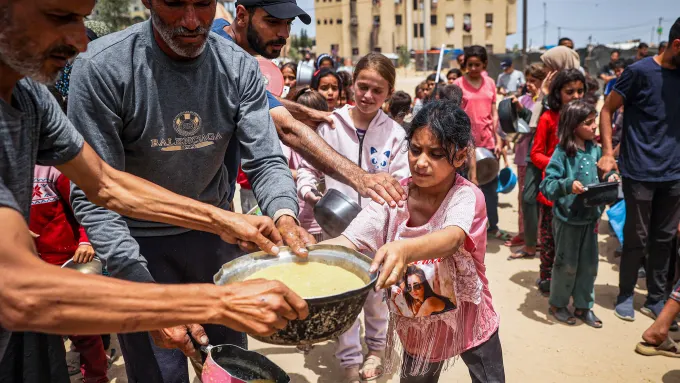The UN’s WFP struggles to feed Gazans in Rafah amid “apocalyptic” conditions, with border closures and escalating conflict worsening the crisis.
The United Nations World Food Programme (WFP) is facing severe challenges in providing food aid to civilians in Rafah, Gaza, amid what its local director describes as “apocalyptic conditions.” With border crossings largely closed, the WFP is currently only able to serve 27,000 people, a small fraction of the approximately one million displaced Gazans in need.
Matthew Hollingworth, the WFP’s country director in Gaza, depicted a grim scenario on Friday, highlighting the relentless bombings, drone sounds, and military presence that have become part of daily life for Rafah’s residents. “People sleep to the sounds of bombing, they sleep to the sounds of drones, they sleep to the sounds of war, as now tanks roll into parts of central Rafah,” Hollingworth told journalists.
The situation has been exacerbated since May 7, when Israel seized control of the Gazan side of the Rafah crossing, the sole non-Israeli controlled entry point for aid into Gaza. This closure has halted the flow of humanitarian aid from Egypt, leaving supplies to accumulate there while Gaza edges towards famine. Hollingworth reported that from May 7 to May 20, not a single WFP truck managed to cross into Rafah from Egypt.
Israeli military operations have further complicated the aid situation. The Israel Defense Forces (IDF) confirmed their presence in central Rafah, with troops discovering and dismantling Hamas rocket launchers, terror tunnel shafts, and weapons caches. The IDF also announced operational control over the Philadelphi Corridor, a crucial buffer zone on the Gaza-Egypt border.
These military actions have led to a 67% reduction in the amount of humanitarian aid reaching Gaza, according to the UN. Currently, Gaza receives an average of 58 aid trucks per day, significantly lower than the 500 trucks per day before the conflict intensified in October. Despite these challenges, some aid has continued to trickle through other crossings such as Kerem Shalom and Erez. On Thursday, the IDF reported that 36 aid trucks were transferred through these points on behalf of the WFP.
Hollingworth revealed that the WFP’s warehouse in Rafah, which once stored 2,700 tons of food, is no longer operational. The organization lacks the supplies needed for significant food distributions, though it manages to provide around 400,000 hot meals to families in central Rafah.
The WFP’s current efforts highlight the severe humanitarian crisis in Gaza and the urgent need for sustained and unobstructed aid delivery to alleviate the dire conditions faced by its civilian population.

